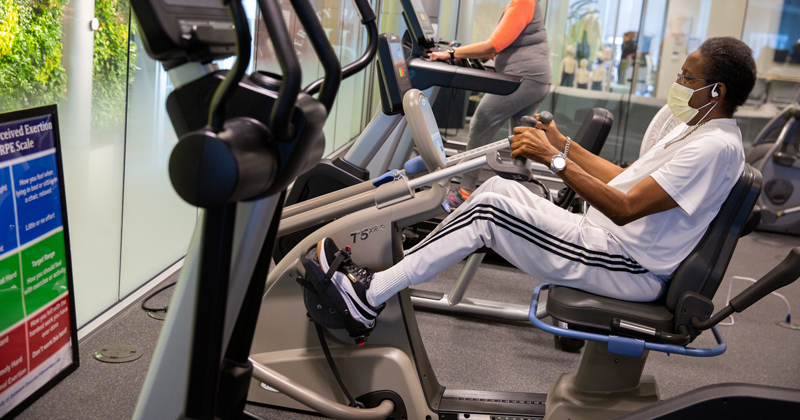

Video about the renal rehab facility at UD: youtube.com/watch?v=i7jnwBj7RFU
Forming a healthy habit
Photo and video by Ashley Barnas January 06, 2021
Unique renal rehab program helps patients with chronic kidney disease safely exercise
Aaron Seymour is making his comeback. Three days a week, the 59-year-old New Castle man visits the Exercise and Functional Training Lab on the second floor of the Tower at the University of Delaware’s Science, Technology and Advanced Research (STAR) Campus. Seymour walks on the treadmill, works up a sweat on the elliptical and lifts weights, all under the watchful eyes of trained clinical exercise physiologists.
For more than a year, Seymour has been a participant in the Department of Kinesiology and Applied Physiology renal rehab program, which provides individualized exercise programs for patients with chronic kidney disease (CKD).
He is one of five renal rehab patients to successfully undergo a kidney transplant. He credits his workouts with program staff before and after his transplant in October 2019 with helping him to recover his mobility and stay healthy.
“This is like my third comeback. Before, I was struggling with the stairs and just day-to-day function. I can’t believe how bad it got,” said Seymour, who spent years undergoing lengthy dialysis treatments to stave off the effects of kidney failure before his transplant. “And here I am, almost back in the race.”
Renal rehab began in 2017 after the success of a research project in the College of Health Sciences. Prof. Dave Edwards received a National Institutes of Health grant to study exercise training in patients with kidney disease. Although the study ended, the patients weren’t ready to give it up — they wanted to continue exercising.

Renal rehab found a home in clinical exercise physiology, where graduate students learn to design, implement and supervise exercise programming for people with chronic cardiopulmonary, metabolic and musculoskeletal diseases as well as healthy and other low-risk populations. Brittany Overstreet, assistant professor and clinical exercise physiology program coordinator, said the renal rehab program has helped train 42 graduate students and provided more than 2,500 hands-on clinical hours to help students qualify for national certifications.
“It is unique. The most popular thing I would compare it with is cardiac rehab and pulmonary rehab. They're a lot more common right now,” said Brittany Glazar, a clinical exercise physiologist on staff with the renal rehab program. “It’s just a safer way for these individuals to exercise rather than going into a gym on their own.”
For patients with kidney disease, exercise can help control blood pressure and blood sugar levels. It can also help them prepare for the physical challenges they will encounter when they undergo their transplant surgery, said Molly Strayer, a registered dietitian in ChristianaCare’s kidney transplant program who refers patients to renal rehab.
“The more debilitated people are, the harder they have on the other end of transplant. Now that they have a working kidney, I want them to be able to get out of bed in the middle of the night and get to the bathroom without falling or not having the strength to get to get there,” Strayer said. “It's really not so much you're doing this to get your kidney. You're doing this to make improvements to your health while you wait so that when you do get that kidney you can be in good shape and enjoy it.”
The program is open to patients with end-stage renal disease, those on dialysis and those like Kathleen McCann, who are on the transplant list but hoping to avoid dialysis. It took her almost a year to secure a spot in renal rehab because of the popularity of the program. The coronavirus (COVID-19) pandemic also upended her exercise schedule when the program closed to in-person visits.
“My kidney numbers are better. I've had my bloodwork done just recently and I'm very stable,” said McCann, who has lived with kidney disease for about 12 years. “My doctor said I’m in better shape and my blood sugars have been coming down. And once your blood sugar stabilizes, so do some of your kidney numbers.”
Strayer said she can tell when patients fully commit to the exercise plans developed for them in renal rehab - they start getting motivated about other parts of their health, too. “They think, ‘Oh, I’m fixing my exercise. I can fix this, too. I can be better with my diet,’” she said. “It’s all together.”
It’s common for patients to be hesitant when they first start the program, Glazar said. But the camaraderie that develops over time with the students and the other participants helps ease the transition.
Before long, they’re dedicated exercisers, she said. “It becomes a community, just a very positive place for them to come in, especially those that are living on their own.”
Before his transplant, Seymour said he had a million reasons why he didn’t want to exercise - he didn’t feel well, he couldn’t move like he used to, he didn’t know how to use the equipment. Now, exercise is the highlight of his day.
“I hated it when I first came here,” he said with a smirk. “But they motivated me. It’s a horrible, horrible day for me if I miss a day.”
And the guy who never wanted to exercise is now the one motivating others. On a Thursday morning in November, he introduced himself to a new patient who was feeling the effects of the workout.
“Don’t worry,” Seymour told the man riding the bike next to him. “It gets better every time.”
To learn more about the supervised exercise programs offered through the College of Health Sciences, contact Brittany Glazar at bglazar@udel.edu or 302-831-0940.
Contact Us
Have a UDaily story idea?
Contact us at ocm@udel.edu
Members of the press
Contact us at 302-831-NEWS or visit the Media Relations website

